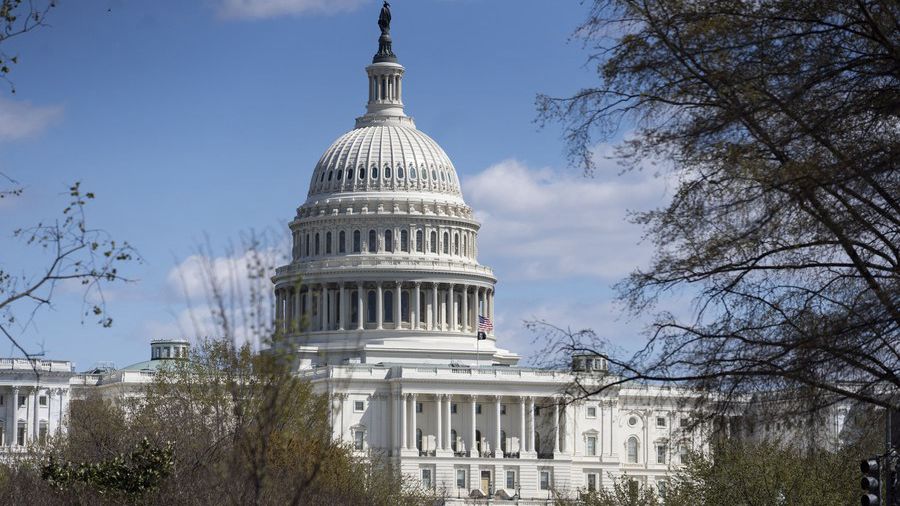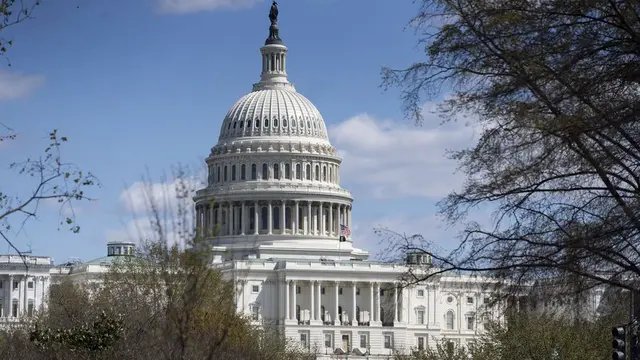
The U.S. Capitol building in Washington, D.C., U.S., April 2, 2021. /Xinhua
**Editor's note: **Keith Lamb is a University of Oxford graduate with an MSc degree in Contemporary Chinese Studies. His primary research interests are China's international relations and "socialism with Chinese characteristics." The article reflects the author's opinions and not necessarily the views of CGTN.
On April 21 the Senate Foreign Relations Committee backed the 281-page Strategic Competition Act of 2021 by 21-1. This bill, which aims to prevent China's rise, states that China's growth is "contrary to the interests and values of the U.S."
I agree, for no matter what country rises it will be against the interests of U.S. hegemonism and the values of one dominating the rest. The fact is, if the global status quo is determined by systemic U.S. unipolar hegemonism then the hitherto poverty, in the global South, well reflects the success of this hegemonism. Global equality, which China seeks, would upset this "unbalance" of power.
The bill explains that China threatens the "future character of the international order" and shapes the rules, norms, and institutions that govern relations among states, which will "risk the ability of the U.S. to secure its national interests; and will put at risk the future of peace, prosperity, and freedom of the international community."
I agree that China's rise will change (not threaten) the rules-based order. China will influence the rules to make them more equitable for the majority of developing states. This balance of influence towards the global South from the minority West represents a truly democratic world order that exists only in the words but not deeds of U.S. policymakers.
This rise of the global South, will in fact, counter the U.S.'s ability to interfere, through political machination and military subjugation, in sovereign affairs. It is tragic that a state as wealthy and powerful as the U.S. sees its national interests as dominating over all others and pushing down those who seek equality.
Can the U.S. elites not think outside the box and accept that the rise of others can also be in their own interests? Are they not able to see the suffering caused by poverty and war is the corollaries of their hegemonic mindset?
To say that China's rise will risk peace, prosperity, and freedom of the international community turns reality on its head. In fact, China's rise has given other states more freedom to choose who they deal with economically and politically. China's prosperity comes not from invading other countries but through trade.
In the bill, the Belt and Road Initiative (BRI) is cited as an example of China's expansion which the bill says will increase Chinese companies' influence and will lead to China seeking "political deference through economic dependence".

Aerial photo shows a view of the Lujiazui area in Shanghai, east China, October 15, 2019. /Xinhua
Firstly, the BRI, a project which seeks to develop the global South, is the greatest beneficial project for mankind. It has been democratically signed up to by over 150 countries which attest to the weariness of those who are fed up with the never-ending poverty and war within the current U.S.-led system.
Secondly, if through the BRI, Chinese companies' influence does expand then it is because they are well able to build infrastructure. The U.S. has only itself to blame for following a policy of de-development through a strategy of expanding its military-industrial complex and promoting war which acts as the harvest for this industry.
Thirdly, the use of the term "economic deference" is laughable considering the use of U.S. sanctions and the weaponization of the dollar. China trades with all; it doesn't sanction others when it doesn't agree with their political system or election results.
Indeed, building up a country's infrastructure is not a recipe for domination as this leads to augmenting a state's power which in turn drives the growth of their own businesses. This is the opposite of the U.S. which maintains actual (not potential) deference through maintaining a world of uneven development that allows it to utilize its superior military and economy against others.
The document goes on to describe China's Leninist model of governance at odds with constitutional democracies like the U.S. True, more centralized power is less corruptible by the inordinate power of foreign governments and capital to buy up politicians and rig elections. However, importantly, China does not seek to export its model.
The bill misrepresents Chinese President Xi Jinping's words when it says socialism with Chinese characteristics could serve as a model for others as being in opposition to democracy. The emphasis is on the "could" which indicates a sovereign choice. In fact, success should inspire others to think outside the box and borrow political-economic elements suitable for one's own needs. However, regime change is not on China's agenda.
The contradiction is that the hyper-aggressive U.S. which seeks to deny others' rise holds itself up as the only legitimate model and violently pushes this model onto other states. Of course, woe betides any state that achieves success with this model for its growth would inevitably be countered by the U.S.
China, in contrast, denies hegemony, it seeks to develop the world, it doesn't demand others follow it, and history shows that China is averse to war which is the antithesis of development. It's time for the U.S. elite to look in the mirror and see that the greatest threat to itself and global democracy is not China but its own actions and delusional mindset which is now projecting its own insecurities onto others.
(If you want to contribute and have specific expertise, please contact us at
.)
 简体中文
简体中文



